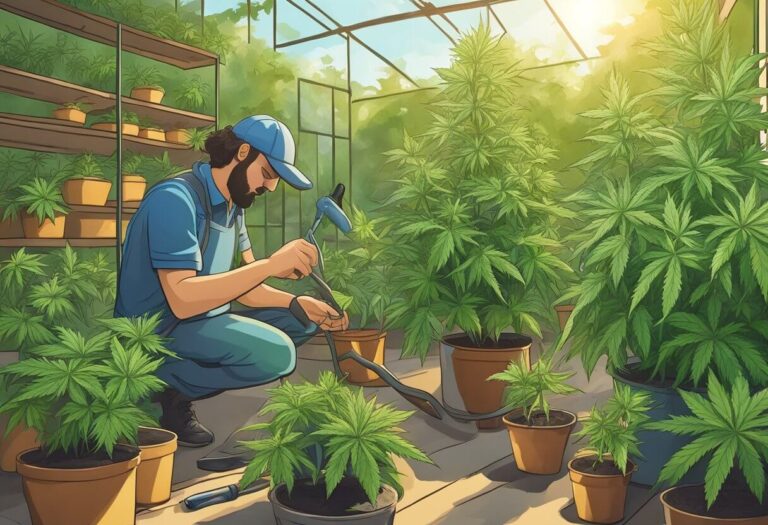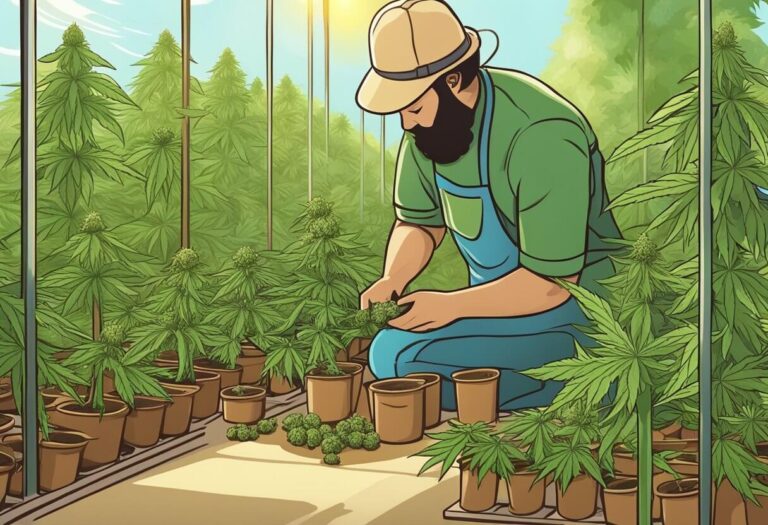Is Weed Legal in Portugal? The Complete 2024 Guide

Portugal is internationally renowned for its progressive drug policies ever since all drugs were decriminalized in 2001. But there’s still a lot of confusion around cannabis laws specifically and if weed is legal in Portugal.
So is weed actually legal in Portugal? No, marijuana is not fully legalized in Portugal in 2024. However, Portugal operates under a decriminalization model for drug offenses related to personal use rather than full legalization. This guide breaks down everything you need to know about cannabis laws, enforcement, purchasing options, medical marijuana access, political efforts towards legalization, and more regarding weed in Portugal.
We’ll cover topics such as:
- Portugal’s decriminalization of personal drug possession
- Potential punishments and penalties for cannabis
- Medical marijuana laws and access
- CBD and hemp products in Portugal
- Purchasing risks for tourists and residents
- Public consumption dangers
- Political efforts to legalize recreational cannabis
- The future outlook for legal weed
So whether you’re planning a trip, considering a move to Portugal, already live there, or are just curious about European cannabis policies, read on for a full overview of laws and legal weed access in Portugal as of 2024!
Portugal’s Decriminalization of Drug Possession
In 2001, Portugal passed a historic law decriminalizing personal possession of small amounts of all drugs for recreational use, including marijuana. This groundbreaking decision emerged in response to rising rates of problematic drug use and related health issues in the late 1990s.
The law made Portugal the first country in the world to adopt such an approach. It also demonstrated the country’s pragmatic attitude and progressive outlook on drug policy reform.
Under these decriminalization measures, having up to 25 grams of cannabis flower or 5 grams of hashish is no longer considered a criminal offense. These threshold amounts constitute what Portuguese law defines as a 10-day supply for personal use based on the statute’s text.
Exceeding those quantities can still potentially result in criminal penalties depending on the exact amounts and overall circumstances. We’ll cover specific potential punishments in more detail shortly.
However, it’s vital to stress that while simple possession and use were decriminalized, buying, selling, distributing, and cultivating cannabis remain illegal in Portugal despite the relaxed laws around personal quantities of drugs.
So in summary – having and using small amounts of weed won’t land you in prison, but supplying cannabis in any capacity can still lead to criminal charges.
Next, let’s look at what actually happens if you’re caught with marijuana in Portugal.
What Happens if You’re Caught With Weed in Portugal?

Portugal’s decriminalization statutes significantly changed the enforcement landscape for low-level drug offenses. But that doesn’t mean there are no longer any penalties or risks associated with cannabis possession despite the relaxed laws.
If discovered to be in possession of or using cannabis, your potential punishment will now depend on the judgment of a local Commission for Dissuasion of Drug Addiction.
These commissions consist of three officials – typically a legal expert, a medical professional, and a social worker or sociologist. Their purpose is to review individual minor drug offense cases and determine whether Addiction Treatment is warranted or advisable.
For most tourists or occasional users, the typical outcome is confiscation of the cannabis without any further mandated actions, treatment, or penalties. However, fines up to the euro equivalent of one month’s minimum wage and other administrative sanctions are also possibilities under the discretionary guidelines.
Your risk of harsher punishment primarily increases for multiple offenses over time or being viewed as exhibiting signs of addictive behavior or dependency. In those instances, mandated counseling or treatment programs become more likely outcomes.
But again, first-time offenders without extenuating circumstances around broader drug misuse rarely receive more than confiscated products from personal possession quantities under 25 grams.
However, it’s essential to remember that amounts over 25 grams of cannabis or 5 grams of hashish can still potentially be charged as criminal trafficking offenses. So Portugal’s decriminalization measures still leave room for stricter penalties and enforcement when larger volumes indicate possible supply-side activities.
In summary – tourists and residents will typically face little recourse for small cannabis quantities besides relinquishing their stash. But risky gray areas remain that can lead to fines, mandated counseling requirements, or criminal charges in some circumstances. So caution and moderation are still warranted despite Portugal’s lax attitudes.
Next, we’ll explore medical marijuana laws and access in Portugal for therapeutic use exemptions from standard cannabis prohibitions.
Medical Cannabis in Portugal
Beyond decriminalization, Portugal also has formal allowances for legal access to medicinal cannabis by prescription since first legalizing medical marijuana in 2018.
The regulations establish that patients can receive cannabis prescriptions to treat symptoms related to conditions such as chronic pain, muscle spasms from multiple sclerosis, nausea from chemotherapy, and PTSD, among other approved indications.
However, doctors in Portugal face some bureaucratic hurdles only allowing marijuana prescriptions once conventional medications and treatment options prove insufficient or intolerable due to side effects. So the practical access is more constrained compared to more permissive medical cannabis regimes internationally.
But overall, the framework legalizes and regulates patient access to medicinal marijuana through standard pharmaceutical channels pending doctor approval.
Unlike some medical cannabis systems, Portugal does not have designated dispensaries. Instead, patients fill their prescriptions at traditional pharmacies once obtaining the required physician recommendation.
Registration cards or ID programs typical of other countries are also currently absent from Portugal’s medical marijuana rules.
Further constraining Portugal’s cannabis accessibility for patients is that all cannabis cultivation remains outlawed for personal use in medical contexts or otherwise.
So in summary:
- Doctors can prescribe medical cannabis for approved conditions after other treatments fail
- Patients then fill prescriptions at normal pharmacies across Portugal
- Home cultivation is still prohibited across all contexts
Compared to legal US states such as California, Portugal’s rules are more limiting regarding what conditions qualify, the overall ease of securing physician approvals, supply infrastructure, and access limitations banning personal home grows.
But the framework still offers essential legal protections and supply channels for medicinal use compared to outright prohibition.
CBD and Hemp Products in Portugal

Beyond medical applications, Portugal also permits general retail sales of CBD and hemp-derived products if they meet certain requirements:
CBD products must contain no more than 0.2% THC to qualify as exempt “light” cannabis preparations permissible for commercial sale without medical justifications.
This threshold aligns with EU regulations governing hemp cultivation and CBD sales continent-wide.
However, Portugal enforces this limit more stringently than some other European nations, explicitly prohibiting products containing detectable but still low THC levels up to 1% contrary to a prevailing gray area elsewhere.
So visitors and residents will discover limited CBD access concentrating mainly around oils and isolates purposely manufactured to omit all but trace THC contents.
Ingestion formats like edibles and vaping supplies face more restrictions regarding allowable THC limits connected to Portugal’s stricter interpretation of overarching EU CBD rules.
But topical products tend to be more widely available through specialty shops and pharmacies for therapeutic use without medical cannabis prescriptions or serious restrictions beyond verified low THC composition.
Hemp cultivation is also legal in Portugal but faces stricter oversight than other parts of Europe. Farmers must maintain THC levels below 0.3% in crops along with securing permits from agricultural authorities and complying with inspections.
Recent regulatory uncertainty regarding hemp also led to cultivation restrictions in early 2019 before eventually allowing the 2022 growing season to proceed.
So in summary:
- CBD products are legal with confirmed THC under 0.2%
- Topicals broadly available but ingestibles and vaping supplies face limitations
- Portugal tightly controls hemp cultivation permits and field monitoring
Despite a generally liberal social mindset, Portugal’s CBD and hemp laws remain somewhat more prohibitive than comparable European nations regarding allowable THC trace amounts in retail consumer products.
Next, we’ll cover the purchasing landscape tourists and residents face when seeking cannabis in Portugal outside of medical contexts.
Is It Legal to Buy Weed as a Tourist in Portugal?
Given cannabis decriminalization, some visitors understandably arrive expecting easy retail access analogous to cannabis coffeeshops ubiquitous in the Netherlands.
However, that is still not the reality on the ground even with Portugal’s relaxed possession penalties.
There are currently no legal recreational stores selling cannabis in Portugal as of 2024 despite decriminalization for personal use.
All distribution remains relegated to clandestine black-market channels absent formal regulations applicable to recreational consumers without medical requirements.
That lack of a legally regulated marketplace creates risks for tourists hoping to casually purchase marijuana from street dealers and dark web sources operating entirely outside legal accountability.
You may encounter locals or savvy fellow travelers with cannabis access willing to share or sell informally.
However, any purchases come with typical black-market risks like counterfeit products, unsafe materials, legal jeopardy from law enforcement, and potential theft/extortion exposure.
While Portugal may not pursue or prioritize enforcement for minor possession, all buying and selling remains illegal – so tourists assume full risks transacting outside medical dispensaries without decriminalization protections.
You won’t instantly become a wanted fugitive for picking up a little bit of weed. But exploratory purchasing still occupies decidedly risky legal territory for visitors unfamiliar with reliable local plugs compared to formally regulated retail settings available elsewhere internationally.
In summary:
- No legal recreational stores currently exist
- Purchases occupy risky legal territory without consumer protections
- Black market dealers carry increased threats of fakes, contamination, and criminal liability
So potential punishments and availability barriers still give reason for pause when tourists consider attempting to buy weed in Portugal.
Next, we’ll explore public consumption laws and social attitudes important for visitors to consider when weighing cannabis usage during their stays.
Where Is It Safe to Consume Marijuana in Portugal?
Portugal’s decriminalization framework understandably causes confusion about legal public consumption analogous to venues commonly tolerated elsewhere like cannabis cafes.
However, it remains vital to remember that change only affected personal possession – not approvals for public use.
You likely won’t face arrest or criminal charges for responsibly consuming cannabis outside during your Portuguese travels.
But public consumption still risks administrative fines and citations absent clear legal allowances comparable to social spaces with legal exemptions seen in the Netherlands and certain US states.
Essentially, the worst typical outcome from public use is a ticket or low-level citation assuming reasonably discreet behavior without brazen abuse or volumes exceeding personal allotments.
But avoid consuming openly around children, near churches, schools, government buildings, etc. to minimize already low risks existing around public cannabis intake.
Hotels and rental properties also sometimes prohibit smoking of any kind in rooms or common areas. So check accommodation policies before on-site consumption to avoid issues.
In summary:
- Public consumption recently decriminalized but still involves administrative penalties
- Discreet public use in adult contexts carries minimal risks
- Hotels/rentals may forbid all smoking – so consume privately
Despite prevalent decriminalization, traditional public consumption laws and norms still classify cannabis separately from Portugal’s relaxed possession outlook. So informed caution remains advisable at this stage countrywide.
Political Efforts to Fully Legalize Recreational Cannabis
While Portugal spearheaded global drug policy reform in 2001, the country has yet to take the further step of fully legalizing recreational cannabis statewide.
But there are strong indications of growing political will to implement broader adult-use legalization in coming years.
In 2021 and again in 2024, legislators introduced bills seeking to establish a legal commercial cannabis market within Portugal via regulated cultivation, production, retail.
These proposals reflect mounting advocacy and public pressure from activists and progressive political factions urging Portugal to evolving with prevailing international drug policy norms evolving towards legalization.
The bills thus far failed to generate sufficient parliamentary support amid concerns Portugal would inspire further reforms contradicting EU stances against recreational cannabis breadth.
However, legalization proponents strengthened their position in subsequent election cycles – potentially indicating measures could pass during the current legislative session if procedural hurdles are navigable.
A key component of that strategy requires configuring commercial market provisions in a manner avoiding direct conflicts with EU business directives. For example, by initially restricting sales within Portugal absent interstate commerce allowances that would violate EU principles.
Leaders hope measured introductory terms may suffice until reaching critical mass convincing EU decision-makers to acknowledge member state reforms redefining unacceptable drug prohibitions.
If successful, economists forecast Portugal legalizing recreational cannabis could generate over EUR 300 million in annual sales via tourists, exports, and domestic spending based on comparable international result.
Those projections further fuel legalization momentum from entrepreneurs and budget-minded legislators alike. Particularly as Portugal continues navigating economic fallout from the COVID-19 pandemic affecting the critically important tourism industry.
In summary:
- Bills repeatedly introduced but failed to pass legalizing recreational cannabis sales
- Core political factions increasingly favoring legalization as public views shift
- Strategic concessions regarding initial trade restrictions may pave way for EU approval
- Projected tax revenues nearing EUR 1 billion annually offer powerful motivation
So while obstacles clearly remain both legislatively and geopolitically before establishing broad recreational cannabis access, there are strong indicators Portugal continues progressing towards that ultimate destination from cultural and economic perspectives.
What Does the Future Hold for Legal Cannabis in Portugal?
Despite its pioneering drug policy history, Portugal is still catching up with transformative cannabis reforms seen elsewhere internationally during the late 2010s and early 2020s.
But potent signs point towards EU resistant recreational access arriving within 5-10 years.
Ongoing medical cannabis expansion will assuredly persist as patient demographics and clinical applications expand. Particularly as Portugal leverages ideal cultivation conditions to grow into a leading European producer and exporter.
Portugal also can reference Spain’s cannabis social clubs – as well as models from the Netherlands and Canada – when crafting more expansive access policies applicable outside strict medical environments for eligible adults.
And if sufficient procedural care navigates EU oversight during inception phases, the enormous tax revenue capacity from future recreational sales may convince otherwise reluctant officials to concede with Portuguese public sentiment favouring progressive reform.
Furthermore, tourists flocking to enjoy Portugal’s enviable climate, urban energy in Lisbon and Porto, iconic regional wineries, and idyllic beaches will undoubtedly stimulate consumer curiosity and hospitality/retail investment once buying opportunities legally emerge.
Powerful cannabis industry players are already eyeing Portugal for future infrastructure investments anticipating legalization. So business infrastructure and supply-chain resources will ramp quickly once statutory reforms reach inflection points cementing legal recreational timelines.
In summary, Portugal staying its characteristic pioneering course towards social progress means cannabis legalization appears inevitable – with the remaining variable being timing contingent upon strategic legislative crafting and navigating persistent EU resistance.
But the question seems less if than when broader reforms will arrive as transitionary medical access blooms and visitors lusting for the total Portuguese experience anticipate partaking in all the nation offers.
Conclusion
Despite a world-leading drug policy history headlined by pioneering 2001 decriminalization reforms, Portugal has yet to take the ultimate step towards legal recreational cannabis sales for responsible adult consumers without medical requirements.
But powerful indicators point towards necessary legislation passing within the next 5-10 years contingent upon careful procedural navigation given ongoing EU objections.
However, tourists and residents still face substantial risks attempting to purchase cannabis outside medical contexts at present even with decriminalized possession and consumption of small amounts for personal use.
So while Portugal made critical early strides improving public health and safety outcomes around drugs contravening deeply rooted societal stigmas, contemporary limitations curb visitor and resident access absent regulated legal cannabis sales frameworks existing elsewhere.
But the gap seems destined to close entirely in coming years as Portugal embraces regulatory models and best practices developed recently abroad. Particularly as cannabis commerce limitations hamper a valuable tourism industry key to Portugal’s post-pandemic economic recovery in the years ahead.
So for travellers and expats eager to enjoy Portugal’s cannabis culture, some patience may still be required before realizing that opportunity. But the road leads conclusively towards recreational access in this otherwise consummately progressive nation often at the vanguard of vital social progress.






